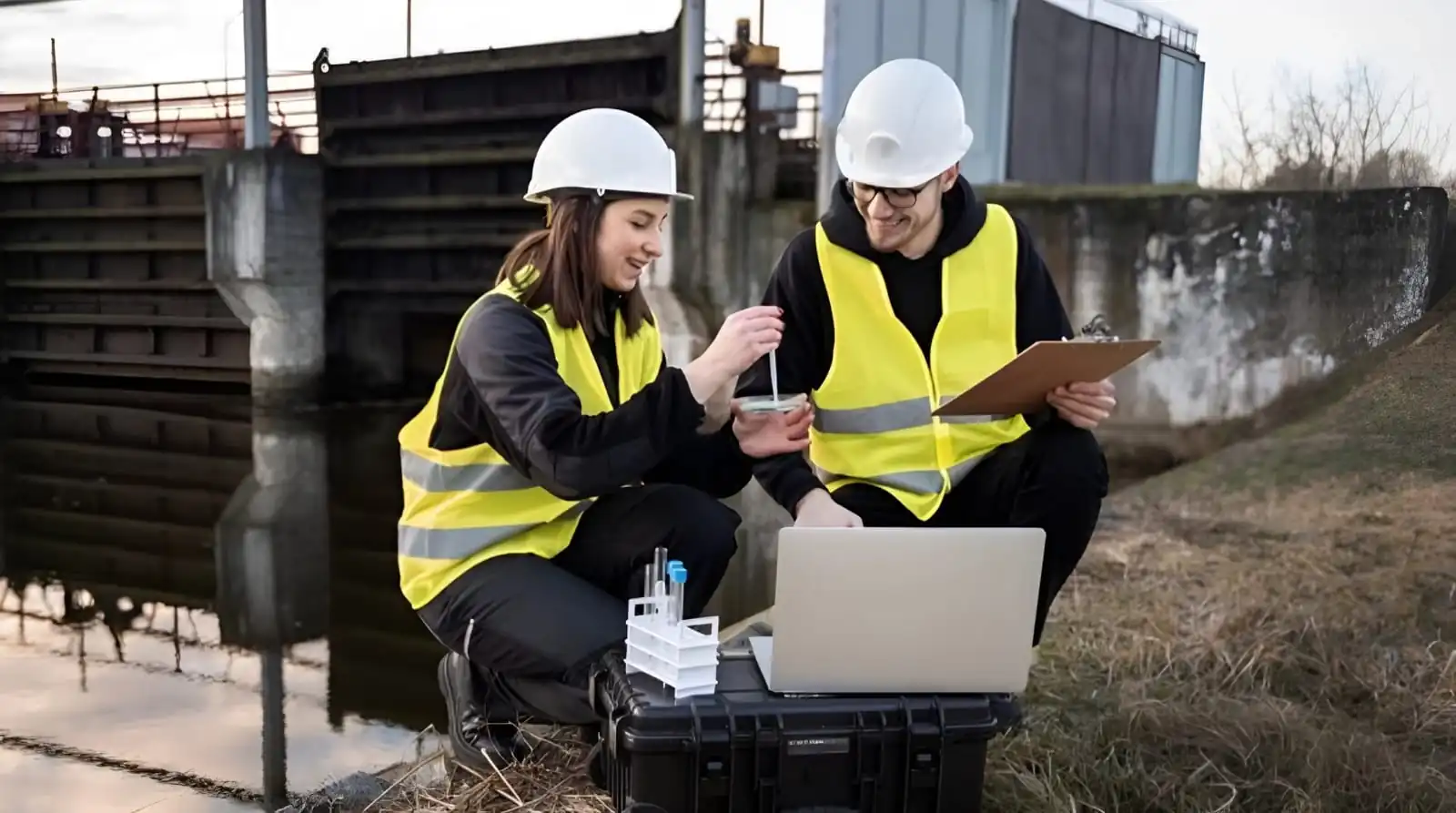Choosing a career can be as daunting as navigating a labyrinth—everyone’s searching for that perfect mix of stability and satisfaction. Consider public utilities: this sector not only keeps our society running smoothly but also offers diverse job roles with growth potential.
Our guide breaks down the advantages and pitfalls, plus the array of positions you might not have imagined—all to steer your career compass in a direction that shines. Read on to evaluate: Is public utilities a good career path in 2024?
Understanding Public Utilities
Public utilities is central to appreciating the complexities and importance of services that are fundamental to our daily lives—delivering clean water, removing waste efficiently, ensuring a reliable electricity supply, and connecting people through telecommunications.
These pillars sustain our modern existence, underpinning everything from home comfort to the pulse of industry.
Water
Every home and business counts on clean water. Public utility workers play a key role in making sure tap water is safe to drink. They work hard to manage the water supply so that communities stay healthy.
Jobs in this field can include checking pipes, fixing leaks, and testing water quality at treatment plants.
Working with water means you get to meet lots of different people. You could be outside by rivers and lakes one day and in a lab doing experiments the next. If you want variety in your job, then focusing on water resources might be exciting for you!
Waste Removal
Waste removal is a crucial part of keeping our communities clean and healthy. People in this field work hard to manage everything, from household trash to hazardous materials. They make sure garbage, recycling, and waste water are properly processed at sewage treatment plants or other facilities.
Jobs here can include driving trucks, operating machinery, planning routes, and maintaining equipment.
Working in waste removal means you’re doing important community service every day. You could start as a plant operator or sewer technician with just a high school diploma. As you gain experience, opportunities for higher positions open up.
This career offers the satisfaction of protecting public health and the environment while providing steady employment.
[Video Credits @cityofgreshamoregon]
Electricity
Electricity lights up our homes and powers our gadgets. It is a vital part of public utilities that communities rely on every day. Workers in this field keep the energy flowing to schools, hospitals, and businesses.
They work at power plants, tackle problems with transmission lines, and maintain substations.
Jobs related to electricity in the public utility sector are both challenging and rewarding. Employees earn competitive salaries that grow with experience and further education. With an average salary ranging from $59,091 to $126,197 per year, there’s room for financial growth.
Plus, these roles come with job security—electricity isn’t going out of style anytime soon! Those interested in this career path can look forward to personal development and opportunities to climb the professional ladder.
Telecommunications
Telecommunications play a crucial role in keeping us connected. As part of the public utilities sector, jobs in this field keep phone lines and internet services running smoothly. Workers install cables, fix cell towers, and maintain satellite systems.
In this digital age, staying online is vital for homes, hospitals, schools, and businesses.
Careers in telecommunications demand skills with high-tech tools and an understanding of complex networks. They offer a chance to work on groundbreaking technology that powers our world’s communication systems.
Every text sent, email received or video stream relies on this industry. Job seekers looking at careers here join teams, ensuring round-the-clock connectivity for millions.
The Advantages of Career in Public Utilities
A career in public utilities offers a sturdy foundation for those seeking stable employment, with ample opportunities for growth and satisfaction that beckon—a realm where competitive salaries meet the fulfilling pursuit of keeping society’s indispensable services flowing.
Job Growth Opportunities
Public utilities are growing steadily. With an average growth rate of 0.51% over the past five years, this sector now employs nearly 676,000 people in the US. If you join this field, expect lots of chances to move up and learn new skills.
Companies often help pay for more schooling and offer bonuses for extra training.
You could start off fixing water pipes and end up managing a big power station! Every day offers a new chance to get better at your job and take on more responsibility. Plus, as people always need electricity and clean water, there will always be jobs waiting for those ready to work hard and learn.
Competitive Salary and Benefits
Earning a good living is key, and public utilities jobs deliver competitive salaries. The average annual salary in this sector hits around $75,969. This means you could be taking home anywhere from $41,000 to more than $130,000 at the top end.
Big companies like Exelon Corporation and Duke Energy stand out for paying well.
Benefits add icing to the cake. Think health insurance, paid leaves, pensions—they’ve got it all. You’ll have peace of mind knowing that your job supports both your present needs and future dreams.
Major players such as American Water Works Company sweeten the deal with extras that make your work-life balance easier to manage.
Job Security
People often worry about losing their jobs. In public utilities, that worry is much smaller. This industry needs workers all the time because everyone uses water and electricity every day.
Jobs here are more secure, even when the economy isn’t doing well. Imagine it like this: no matter what happens, people still need to turn on lights and fill their glasses with water.
Stable careers in public utilities can give you peace of mind. You won’t have to stress as much over job cuts or being replaced. With consistent demand for services like sewage removal and safe water delivery, your skills will always be needed.
Workers find comfort knowing they provide essential services that communities rely on—rain or shine, boom or bust.
Career in Public Utilities: Disadvantages
Working in public utilities can be tough. Many factors might make this field a hard choice for job seekers.
- Long hours and shift work are common in the public utilities industry, which can lead to less time with family and friends.
- The pay rates in some utility jobs may not match those in industries like technology or finance.
- Keeping up with new technologies is vital, yet it can be challenging as advancements happen fast.
- Workers face growing competition for public utility jobs, making it harder to land a position.
- Market fluctuations can lead to periods without work, creating financial stress for employees.
- Jobs like power generation require hard physical labor that not everyone can handle.
- Compared to high-paying industries, a career in utilities might offer lower salary potential.
Roles and Responsibilities in Public Utilities
In the dynamic field of public utilities, professionals undertake diverse roles, each a crucial cog in the machine that keeps our society’s most essential services running smoothly.
From strategizing water supply systems to maintaining power grids, these positions involve specialized expertise and a commitment to community well-being, ensuring every light switch flicked or faucet turned delivers reliable results.
Utility Manager
A utility manager keeps our water clean, lights on, and houses warm. They are in charge of the teams that build and fix our power stations and sewer systems. Their work involves planning how to keep these services running smoothly every day.
Also, they must be ready for emergencies like storms or blackouts.
Utility managers work closely with safety trainers to ensure everyone stays safe on the job. They coordinate with engineers when a new piece of equipment is needed at a plant or when there’s an update in technology.
It’s their job to make sure projects finish on time and within budget while following strict safety rules. Your skills as a utility manager can make a real difference in people’s lives by providing essential services we all depend on.
Safety and Criticality Engineer
Safety Criticality Engineers play a key role in public utilities. They make sure nuclear fuel is handled safely. Their job is to keep up with safety rules and protect people. These engineers work hard every day to give us the power we need without harm.
Being a safety criticality engineer means you’ll look at complex problems and find smart solutions. You’re the one who makes sure energy stays safe for everyone, from families to schools.
Your skills help prevent accidents and let people live their lives with reliable power. It’s not just about nuclear energy—your impact spreads across all kinds of essential services!
Water Resources Engineer
Water resources engineers are vital in the public utilities industry. They design systems that supply clean water to your home and find ways to manage rivers and lakes. These engineers make sure everyone has enough water and that it’s safe to use.
They work closely with other experts to keep our environment healthy.
Their day-to-day duties include coming up with plans for new water projects and fixing any problems with old ones. Water resources engineers also talk to the public about how these systems work.
Their job keeps them busy solving complex challenges, like preventing floods or making sure there is always enough drinking water during a drought. A career as a water resources engineer means you’ll help communities thrive by ensuring they have access to one of life’s most essential resources—water.
Substation Technician
Substation technicians are key players in keeping our lights on and appliances running. They work hard to ensure electricity gets from power plants to homes and businesses without a hitch.
These technicians install, fix, and maintain the equipment that controls the flow of electricity. Think of them as guardians of the grid.
Every day is different for substation technicians. They might be inspecting giant transformers one day and troubleshooting control circuits the next. Their skills keep our modern world powered up.
If you like solving problems and want a job with solid security, becoming a substation technician could be a great move!
High-Paying Jobs in Public Utilities
Unlock the potential for financial success within public utilities; this sector offers a diverse array of high-paying roles that cater to innovative minds keen on making an impact.
From ensuring public safety as a radiation safety officer to engineering the pipelines that power our homes, these positions promise rewarding salaries and opportunities for those with the right expertise.
Wastewater Engineer
Wastewater engineers play a crucial role in public utilities. They make sure our communities stay clean by managing wastewater removal. These professionals design systems to treat and recycle water, keeping our environment safe.
With a national average salary of $42,104 per year, these jobs offer steady pay.
A career as a wastewater engineer means working on important projects like sewage system upgrades and water treatment plants. You could work for major energy companies or local government agencies.
If you enjoy solving problems and care about the planet, this job might be perfect for you! Plus, with job stability and chances for advancement, it’s a solid choice in the public utilities sector.
Wind Turbine Technician
Wind turbine technicians climb high into the sky to keep turbines turning and energy flowing. These experts are vital in the renewable energy industry. They install, maintain, and repair wind turbines.
This job is not just about heights; it’s also about understanding complex machinery and electrical systems.
Earning a competitive salary as a wind turbine technician is quite possible, with national averages ranging from $59,091 to $126,197 annually. Working as a wind turbine technician can lead you to thrilling places while contributing to clean energy production.
It’s hands-on work that demands safety training but offers rewarding challenges every day.
Radiation Safety Officer
Radiation safety officers play a crucial role in protecting workers and the environment from harmful nuclear substances. These professionals use their expertise to test fuel and equipment and ensure everyone’s safety around nuclear power plants.
They develop detailed reports and presentations about their findings to help teams understand the risks. With a certified utility safety professional (CUSP) certification, they gain industry-wide recognition.
Their job is essential where nuclear regulatory commission standards are strict. Radiation Safety Officers stay alert to prevent accidents at sites where radioactive materials are used or stored.
They make sure all safety regulations are followed closely. This career choice can lead to high job satisfaction due to its critical importance in community well-being and worker health.
Pipeline Engineer
Pipeline engineers play a key role in the public utilities sector. They design and build networks that move oil, gas, and other resources across vast distances. Their work ensures that communities get the energy they need every day.
These experts manage projects from start to finish—planning routes, choosing materials, and making sure everything meets strict safety standards.
Working as a pipeline engineer comes with both challenges and rewards. Long hours might be part of the job, especially when deadlines are tight. Yet these professionals earn high salaries for their expertise in oilfield development and natural gas transportation.
With the industry growing fast, new jobs keep opening up for those ready to take on this important work.
Entry-Level Jobs in Public Utilities
Diving into the public utilities sector opens a world of potential, with entry-level positions like plant operator and drain and sewer technician providing an essential springboard to launch your career—discover how these foundational roles can pave the way for professional growth and success.
Plant Operator
Plant operators play a vital role in public utilities. They keep an eye on how things work and fix problems when they come up. These jobs are great for starting a career because you can move up over time.
People working as water treatment plant operators make about $46,951 a year on average.
Working in this position, you might manage supplies and look after the team. It’s your job to make sure everything runs smoothly and safely. This means being detail-oriented and responsible is key.
If you enjoy making sure people have essential services like clean water, this could be the perfect job for you!
Drain and Sewer Technician
Drain and sewer technicians play a crucial role in keeping our water systems clean and functioning. They inspect, clean, and repair sewer lines and drains. With an average salary of $29,000 per year and a strong job growth rate of 14%, this field offers solid opportunities for those just stepping into the workforce.
You don’t need more than a high school diploma to start in this position, which opens doors for many job seekers without formal education.
Working as a drain and sewer technician means dealing with septic tanks and ensuring that waste removal services are uninterrupted for homes and businesses. It’s hands-on work that can be very satisfying for someone who likes solving problems.
Plus, there are thousands of jobs available across the country. If you like fixing things and want to make sure communities stay healthy, consider becoming a drain and sewer technician—a vital part of the public utilities sector.
Solar Technician
Solar technicians play a key role in the growing field of renewable energy. They get to work with their hands to build, put up, and fix solar panels. This job is for those who enjoy being outdoors and have a knack for mechanics.
It makes a real difference by powering homes and businesses with clean energy.
The pay isn’t bad either; solar techs earn about $50,528 a year on average. Jobs in this area are increasing quickly as more people want solar power. As you start out, you’ll learn valuable skills that can lead to bigger things in your career.
If you’re into technology and care about the environment, becoming a solar technician could be a smart move!
Education and Certification Requirements for a Career in Public Utilities
To land a job in public utilities, you often need to start with the basics. A high school diploma is essential. But don’t stop there; further education can open many doors. Consider getting a degree in engineering if you’re eyeing top-paying jobs like petroleum engineer or nuclear licensing engineer.
These careers call for at least a bachelor’s degree and sometimes even more.
Certifications add a golden touch to your resume as well. For those aiming to stand out, becoming a certified utility safety professional (CUSP) is a smart move. Many employers value this certification, including big names like NextEra Energy Inc., Duke Energy Corporation, and Florida Power & Light (FPL).
Keep learning once you land that job too! Companies often reward employees who continue their education through tuition reimbursement programs, putting career growth within reach.
Top Universities for Public Utilities Studies
For those aspiring to excel in the public utilities sector, selecting a reputable institution is crucial—prestigious universities provide not only foundational knowledge but also cutting-edge insights into utility regulation and management.
These top-tier schools equip students with the necessary tools to navigate the complexities of water, waste, electricity, and telecommunications services.
Michigan State University
Michigan State University stands out in the field of public utility education. Students get to learn from experts about water systems, energy production, and waste management. The university has a strong program focusing on Public Utility Regulation and Economics (PURE).
Classes cover everything from oil and gas to renewable resources.
People studying at Michigan State can explore internships with leading energy companies like NextEra Energy Resources. They gain real-world experience that helps them stand out in the job market after graduation.
Courses prepare them for high-demand jobs such as petroleum engineers or public power managers. This school is a smart choice for anyone serious about a career in public utilities.
University of Florida
The University of Florida stands out for those interested in making a mark in public utilities. Its Public Utilities Research Center (PURC) is committed to shaping leaders well-versed in infrastructure policy and utility regulation.
Students dive into issues related to water, waste removal, electricity, and telecommunications. They learn from seasoned professionals about the complexities of energy company strategies and gas extraction policies.
With this university’s program, you’ll get hands-on experience that puts you ahead of the game. Imagine mastering skills that help manage resources like oil deposits or designing systems for pipeline transport.
At the University of Florida, your education isn’t just about getting a degree—it’s about preparing to lead and innovate in a sector that powers our daily lives.
New Mexico State University
New Mexico State University shines as a leader for those interested in public utilities studies. This institution prepares students for careers that keep cities and towns running smoothly.
From understanding water supply challenges to managing electric grids, the courses here cover it all. Students dive into real-world scenarios, learning how to make smart decisions in this vital sector.
With a degree from New Mexico State, job seekers can stand out to employers like NextEra Energy, Inc., Gulf Power Company, or national associations focused on utility regulations. The university offers both the knowledge and credentials needed to propel graduates into high-demand roles such as utility managers or radiation safety officers.
Their education is tailored to meet the needs of an evolving industry, equipping them with tools for drilling down complex problems or auditing systems for better efficiency.
Is Public Utilities a Good Career Path?
You might thrive in a public utilities career if you enjoy stable work that serves the community. This field looks for people ready to commit, with roles fit for those who like hands-on tasks or office-based duties.
Imagine working as a utility manager or water resources engineer, where every day you help keep lights on and water flowing. It’s fulfilling knowing your job directly benefits the lives of many.
Think about joining this robust sector if you’re after competitive pay and solid benefits. With opportunities ranging from plant operator to pipeline engineer, these jobs need skilled workers who can handle responsibility.
Plus, with potential perks like retirement plans and sick days, this path provides security that’s rare in other fields. Your choice could mean supporting families and businesses by ensuring their essential services never stop running smoothly—an important role in any community.
Conclusion
Public utilities careers shine with promise. They offer stable jobs and solid pay. Growth and learning never stop here. But remember, this path demands commitment. Are you ready to power up communities?.








































